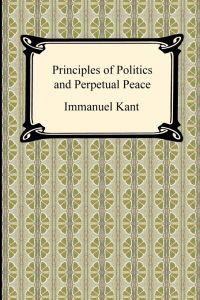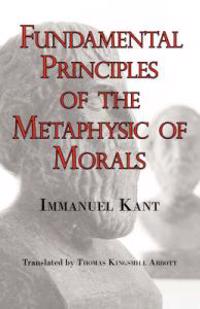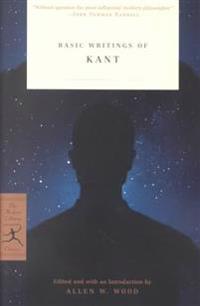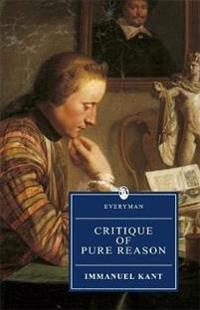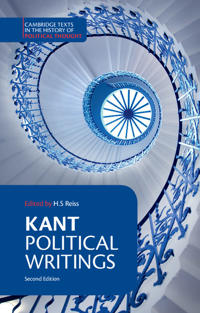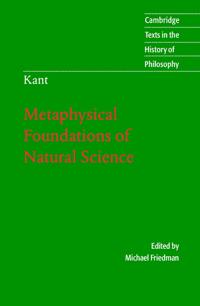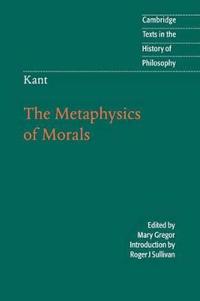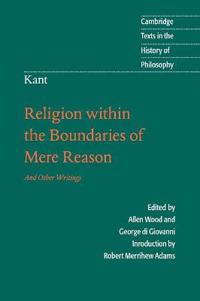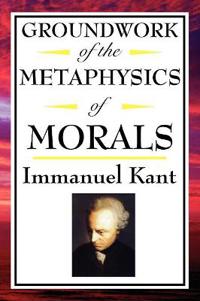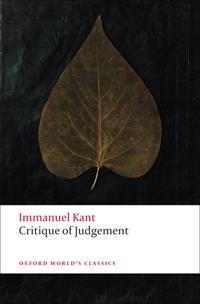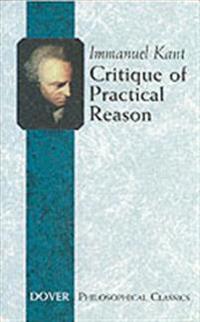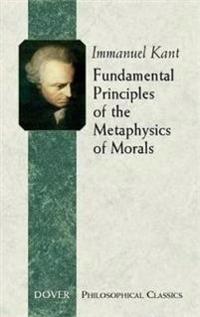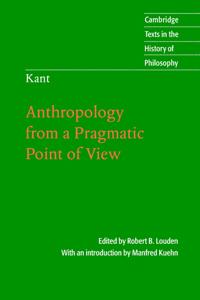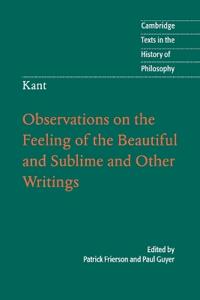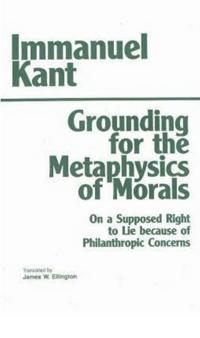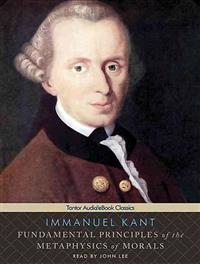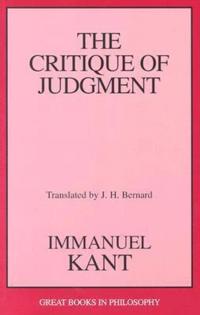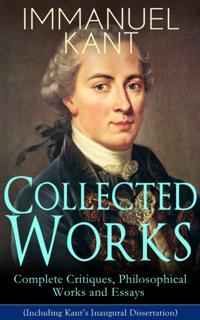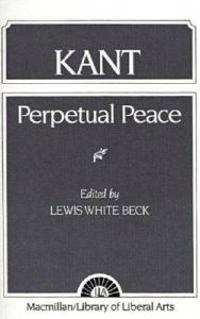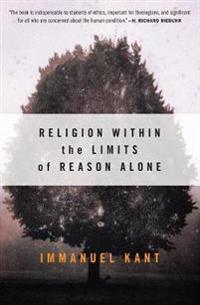Immanuel Kant (Pocket)
avImmanuel Kant, Jens (EDT) Timmermann, Mary (TRN) Gregor
ISBN: 9781107615908 - UTGIVEN: 2014-04Published in 1785, the Groundwork of the Metaphysics of Morals is one of the most powerful texts in the history of ethical thought. In this book, Immanuel Kant formulates and justifies a supreme principle of morality that issues universal and unconditional moral commands. These commands receive thei[...]
Kant's Principles of Politics and Perpetual Peace (Pocket)
avImmanuel Kant, W. (TRN) Hastie, Immanuel Kant
ISBN: 9781420938258 - UTGIVEN: 2010-01Kant's Fundamental Principles of the Metaphysic of Morals (Pocket)
avImmanuel Kant, Thomas Kingsmill (TRN) Abbott, Immanuel Kant
ISBN: 9781604500950 - UTGIVEN: 2008-02Basic Writings of Kant (Häftad)
avImmanuel Kant, Karl Friedrich
ISBN: 9780375757334 - UTGIVEN: 200108With an Introduction by renowned Kant scholar Allen W. Wood, this is the only available one-volume edition of the essential works of the Enlightenment's greatest philosopher and one of the most influential thinkers of modern times. Containing carefully selected excerpts from his most frequently taug[...]
Kant: Critique of Pure Reason (Storpocket)
avImmanuel Kant
ISBN: 9780460873581 - UTGIVEN: 1993-12A long-awaited new translation of an epochal philosophical text by two distinguished scholars
Kant Political Writings (Pocket)
avImmanuel Kant, Hans Siegbert Reiss, Hans Siegbert Reiss
ISBN: 9780521398374 - UTGIVEN: 199101The original edition of Kant: Political Writings was first published in 1970, and has long been established as the principal English-language edition of this important body of writing. In this new, expanded edition, two important texts illustrating Kantsâs view of history are included for the f[...]
Kant: Metaphysical Foundations of Natural Science (Häftad)
avImmanuel Kant
ISBN: 9780521544757 - UTGIVEN: 200409Kant was centrally concerned with issues in the philosophy of natural science throughout his career. The Metaphysical Foundations of Natural Science presents his most mature reflections on these themes in the context of both his âcriticalâ philosophy, presented in the Critique of Pure Reas[...]
Kant: The Metaphysics of Morals (Häftad)
avImmanuel Kant
ISBN: 9780521566735 - UTGIVEN: 199604The Metaphysics of Morals is Kantâs major work in applied moral philosophy in which he deals with the basic principles of rights and of virtues. It comprises two parts: the âDoctrine of Rightâ, which deals with the rights which people have or can acquire, and the âDoctrine of Vir[...]
Kant: Critique Of Practical Reason (Pocket)
avImmanuel Kant
ISBN: 9780521599627 - UTGIVEN: 1997-11-13A new edition of a seminal text in the history of moral philosophy.
Kant: Religion within the Boundaries of Mere Reason (Häftad)
avImmanuel Kant
ISBN: 9780521599641 - UTGIVEN: 199811Religion within the Boundaries of Mere Reason is a key element of the system of philosophy which Kant introduced with his Critique of Pure Reason, and a work of major importance in the history of Western religious thought. It represents a great philosopherâs attempt to spell out the form and co[...]
Kant's Prolegomena to Any Future Metaphysics (Häftad)
avImmanuel Kant
ISBN: 9781420938265 - UTGIVEN: 2010-01Kant's Prolegomena to Any Future Metaphysics (Häftad)
avImmanuel Kant, Dr Paul Carus
ISBN: 9781498024020 - UTGIVEN: 2014-03Kant Groundwork of the Metaphysics of Morals (Pocket)
avImmanuel Kant
ISBN: 9781604592542 - UTGIVEN: 2008-02Critique of Judgement (Pocket)
avImmanuel Kant, Chris Baldick, Immanuel Kant
ISBN: 9780199552467 - UTGIVEN: 200908'beauty has purport and significance only for human beings, for beings at once animal and rational' In the Critique of Judgement (1790) Kant offers a penetrating analysis of our experience of the beautiful and the sublime, discussing the objectivity of taste, aesthetic disinterestedness, the relatio[...]
Critique of Practical Reason (Pocket)
avImmanuel Kant, Thomas Kingsmill Abbott, Immanuel Kant
ISBN: 9780486434452 - UTGIVEN: 200402Fundamental Principles Of The Metaphysics Of Morals (Pocket)
avImmanuel Kant, Thomas Kingsmill Abbott, Immanuel Kant
ISBN: 9780486443096 - UTGIVEN: 200505What is morally permissible, and what is morally obligatory? These questions form the core of a vast amount of philosophical reasoning. In this landmark work, Kant proposes the concept of a maxim, which functions as a guide to appropriate action under a given set of circumstances. By universalizing [...]
Anthropology from a Pragmatic Point of View (Pocket)
avImmanuel Kant, Robert B. Louden, Immanuel Kant
ISBN: 9780521671651 - UTGIVEN: 200603Anthropology from a Pragmatic Point of View essentially reflects the last lectures Kant gave for his annual course in anthropology, which he taught from 1772 until his retirement in 1796. The lectures were published in 1798, with the largest first printing of any of Kant's works. Intended for a broa[...]
Observations on the Feeling of the Beautiful and Sublime and Other Writings (Pocket)
avImmanuel Kant, Patrick (EDT) Frierson, Immanuel Kant
ISBN: 9780521711135 - UTGIVEN: 2011-03This volume collects Kant's most important ethical and anthropological writings from the 1760s, before he developed his critical philosophy. The materials presented here range from the Observations, one of Kant's most elegantly written and immediately popular texts, to the accompanying Remarks which[...]
Grounding for the Metaphysics of Morals (Pocket)
avImmanuel Kant, James W. Ellington, Immanuel Kant
ISBN: 9780872201668 - UTGIVEN: 1993063rd edition with 'On a Supposed Right to Lie because of Philanthropic Concerns'.
The Philosophy of Law (Pocket)
avImmanuel Kant, William (TRN) Hastie, Immanuel Kant
ISBN: 9781409950233 - UTGIVEN: 2009-01Fundamental Principals of the Metaphysics of Morals (CD-bok)
avImmanuel Kant, John (NRT) Lee, Immanuel Kant
ISBN: 9781452602219 - UTGIVEN: 2011-04Immanuel Kant's Fundamental Principles of the Metaphysics of Morals, first published in 1785, is an essential contribution to moral philosophy that lays out clearly and concisely the ideas and arguments, including the famous categorical imperative, that would shape Kant's later works.[...]
The Critique of Judgment (Pocket)
avImmanuel Kant, J. H. (TRN) Bernard, Immanuel Kant
ISBN: 9781573928373 - UTGIVEN: 2000-11Considered by Kant to be the culmination of his critical philosophy, "The Critique of Judgement" was the last work in the trilogy begun with "The Critique of Pure Reason" and continued with "The Critique of Practical Reason". In this work Kant seeks to establish the a priori principles underlying th[...]
Collected Works of Immanuel Kant: Complete Critiques, Philosophical Works and Essays (Including Kant's Inaugural Dissertation)
ISBN: 9788026845430 - UTGIVEN: 2015-10This carefully crafted ebook: "e;Collected Works of Immanuel Kant: Complete Critiques, Philosophical Works and Essays (Including Kant's Inaugural Dissertation)"e; is formatted for your eReader with a functional and detailed table of contents.Table of Contents:Introduction:IMMANUEL KANT by Ro[...]
Religion within the Limits of Reason Alone (Häftad)
avImmanuel Kant
ISBN: 9780061300677 - UTGIVEN: 200808A Monumental Figure of Western Thought Wrestles with the Question of God Immanuel Kant (1724-1804) is one of the most influential philosophers in the history of Western philosophy. His contributions have had a profound impact on almost every philosophical movement that followed him. Kant's teachings[...]


